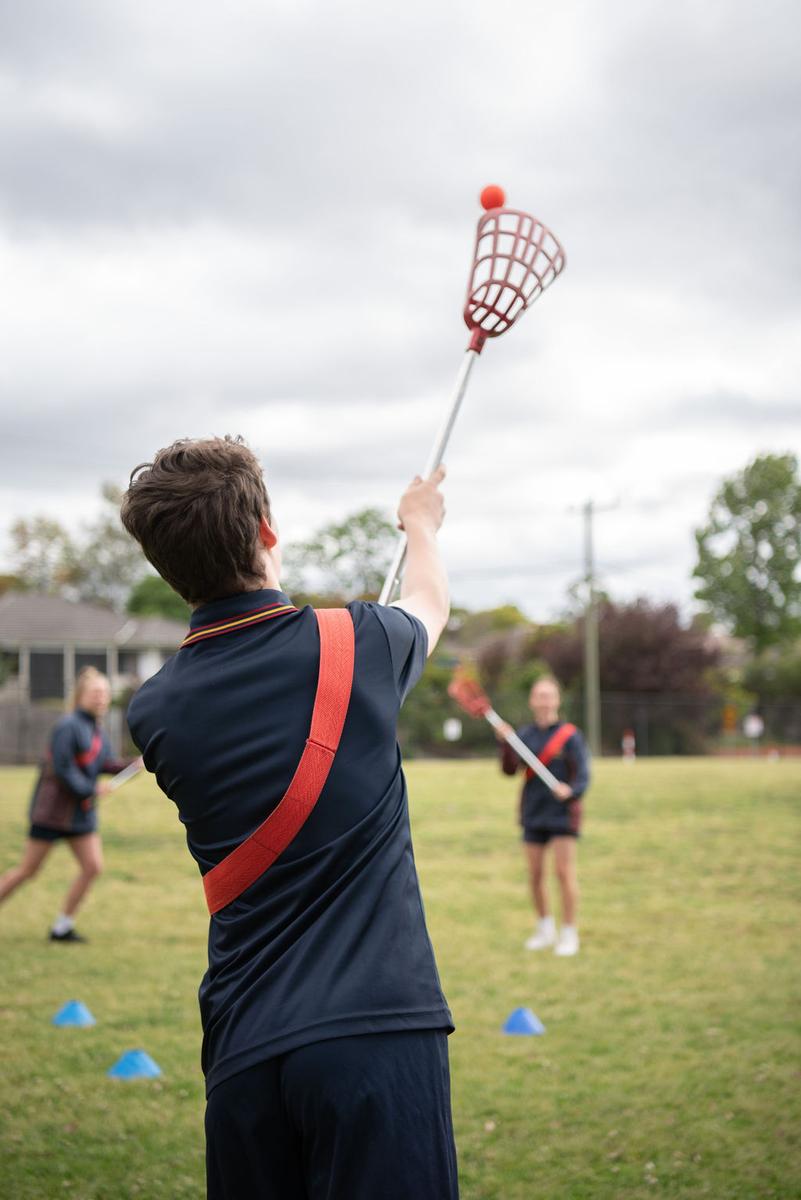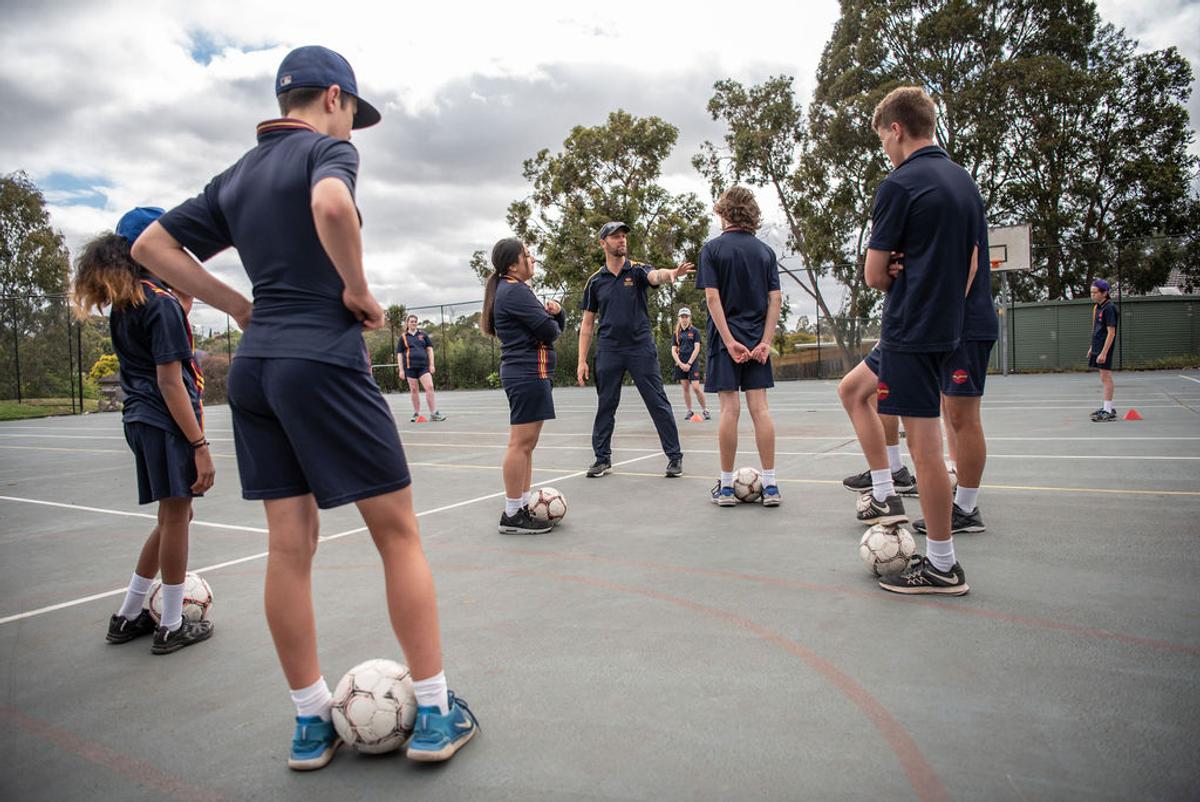Year 9 Health and Physical Education

| Core Health/PE Subjects (Year Long) | Health/PE Elective Subjects (Year Long or Semester Based) |
|---|---|
| Core Health and Physical Education | Duke of Edinburgh (Year Long) |
| Sport Exercise and Nutrition | |
| Coaching and Enhanced Performance |
Core Health and Physical Education
Students will demonstrate high-level motor skills by participating in a range of sporting situations which draw on previous sports. Such sports may include, but are not limited to, Volleyball, Softball/Baseball, Lacrosse and Touch Rugby. Students participate in a Fitness program over the course of Semester 1. Over the course of the year, students will participate in a Health Education theory course. Topics covered will include, but are not limited to, Relationships, Sexual Education, Risk Taking – Illicit Drugs, and Mental Health. Elements of the course also link in with the Fitness unit in Physical Education classes.
Health Education
Students will learn to:
- Evaluate factors that shape identities, and analyse how individuals impact the identities of others .
- Examine the impact of changes and transitions on relationships .
- Propose, practise and evaluate responses in situations where external influences may impact their ability to make healthy and safe choices .
- Investigate how empathy and ethical decision-making contribute to respectful relationships.
- Evaluate and apply information from a range of sources to health decisions and situations.
- Plan, implement and critique strategies to enhance the health, safety and wellbeing of communities.
Physical Education
Students will learn to:
- Perform and refine specialised movement skills in challenging movement situations.
- Evaluate own and others’ movement compositions, and provide and apply feedback in order to enhance performance situations.
- Develop, implement and evaluate movement concepts and strategies for successful outcomes.
- Design, implement and evaluate personalised plans for improving or maintaining their own and others’ physical activity and fitness levels.
- Devise, implement and refine strategies demonstrating leadership and collaboration skills when working in groups or teams.
- Transfer understanding from previous movement experiences to create solutions to movement challenges .
Duke of Edinburgh (Bronze)
Semester 1: Physical Recreation (6 months) and Adventurous Journey (1 overnight camp).
Semester 1 encourages participation in physical recreation and improvement in physical fitness. Students will also be encouraged to develop a variety of personal interests and practical skills. It will involve 1 overnight camp which is compulsory.
Semester 2: Service (3 months) and Skill (3 months) and Adventurous Journey (2-night camp)
Semester 2 encourages students to develop a sense of community spirit and responsibility to others. Students will work more independently in organizing a placement and becoming involved in a major project to raise awareness of, and for, the community.
Students participate in community service at a suitable location of their choosing for approximately 1 hour per week over the course of the semester. This semester also includes a 2-night camp which is also compulsory.
Personal, Social and Community Health
Students will learn to:
- Plan, implement and critique strategies to enhance the health, safety and wellbeing of their communities.
- Plan and evaluate new and creative interventions that promote their own and others’ connection to community and natural and built environments.
- Critique behaviours and contextual factors that influence the health and wellbeing of their communities.
Moving the Body
Students will learn to:
Perform and refine specialised movement skills in challenging movement situations.
Develop, implement and evaluate movement concepts and strategies for successful outcomes.
Extra-Curricular Contribution: The estimate for the 2025 program is $450.
Sport, Exercise and Nutrition
In this subject, students will examine the role physical activity has played historically in defining cultures and cultural identities. Students will compare and contrast a range of actions that could be undertaken to enhance their own and others’ health, safety and wellbeing. They will also have the opportunity to apply and transfer movement concepts and strategies to new and challenging movement situations. This will all take place through a lens of sports, lifelong physical activity and how our food intake pre, during and post exercise, may assist in promoting performance. We hope this subject appeals to students who are engaged in learning more about how to maximise their own personal health and wellbeing, and want to apply this knowledge in a practical setting.
Moving our Body
Students will learn to:
- Perform and refine specialised movement skills in order to apply them in challenging situations.
- Develop, implement and evaluate movement concepts and strategies for successful outcomes.
- Evaluate own and others’ movement compositions, as well as provide and apply feedback in order to enhance performance situations.
Learning through Movement
Students will learn to:
- Transfer understanding from previous movement experiences to create solutions to movement challenges.
- Participate positively in groups and teams by encouraging others and negotiating roles and responsibilities.
- Devise, implement and refine strategies demonstrating leadership and collaboration skills when working in groups or teams.
- Reflect on how fair play and ethical behaviour can influence the outcomes of movement activities.
Coaching and Enhancing Performance
In this subject, students will have the opportunity to grow as young leaders in the sport/exercise space. Students will explore how to give and receive effective feedback to their peers to ultimately guide growth and enhance their performance. This will require cooperation, respect and fair play across a range of health and movement contexts. The students will also utilise their knowledge of movement strategies and apply this to new and challenging movement situations. We hope this subject appeals to active, aspirational young leaders, who can develop their own skill set through critical thinking whilst wanting to develop their peers through constructive feedback.
Moving our Body
Students will learn to:
- Perform and refine specialised movement skills in order to apply them in challenging situations.
- Develop, implement and evaluate movement concepts and strategies for successful outcomes.
- Evaluate own and others’ movement compositions, as well as provide and apply feedback in order to enhance performance situations.
Learning through Movement
Students will learn to:
- Transfer understanding from previous movement experiences to create solutions to movement challenges.
- Participate positively in groups and teams by encouraging others and negotiating roles and responsibilities.
- Devise, implement and refine strategies demonstrating leadership and collaboration skills when working in groups or teams.
- Reflect on how fair play and ethical behaviour can influence the outcomes of movement activities.

